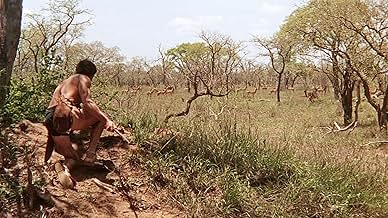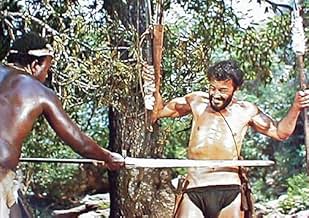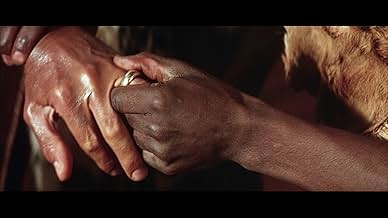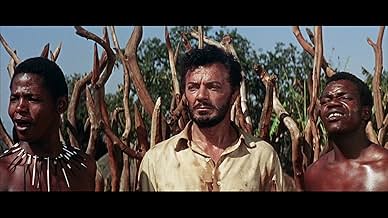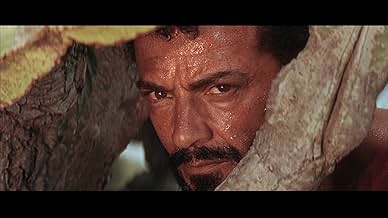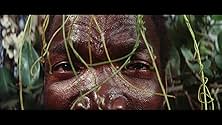ÉVALUATION IMDb
7,3/10
6,1 k
MA NOTE
Ajouter une intrigue dans votre langueDuring the 1800s, a safari guide, two elephant hunters and their crew run into trouble with the natives in the South African veld when they refuse to offer gifts to the tribesmen.During the 1800s, a safari guide, two elephant hunters and their crew run into trouble with the natives in the South African veld when they refuse to offer gifts to the tribesmen.During the 1800s, a safari guide, two elephant hunters and their crew run into trouble with the natives in the South African veld when they refuse to offer gifts to the tribesmen.
- Nommé pour 1 oscar
- 1 nomination au total
Gert van den Bergh
- 2nd Man
- (as Gert van der Berg)
Avis en vedette
Way back in 1932---around the same time that Director Ernest B. Schoedsack was involved in production of the original classic "King Kong"----he also made another classic film entitled "The Most Dangerous Game (MDG)." Based on a famous story by Richard Connell, MDG tells the tale of a megalomaniac hunter who lives on a remote island. Ships would regularly end up wrecked on reefs near the island. Their passengers and crew would be rescued by our hunter----enjoy his sophisticated hospitality for a time---and then end up as prey as our crazy hunter indulges in his very perverse "sport." MDG starred a very young Joel McCrea and two members of the original "King Kong" cast----Fay (I never met a scream that I didn't like!) Wray and Robert Armstrong. At 63 minutes in length, MDG is the model of an exciting and compact thriller film.
Since the basic idea of someone being forced into the totally unexpected role of an innocent victim hunted down with the intention of becoming another's trophy kill is pretty powerful-----it has been remade into numerous films ("Game of Death," "Run for the Sun," etc.).
The plot device is essentially the same one that Cornel Wilde employed in his variation on MDG entitled "The Naked Prey" released some 34 years after the original film. Wilde makes his movie interesting by having a big game hunter becoming the hunted, and changing the megalomaniac hunter into a band of African tribesmen determined to chase down the Wilde character and do him in.
Wilde also indulges his film with numerous symbolic devices and sub-plot lines---but remains true to the basic premise of MDG. Survival is a battle of wits between the hunter(s) and the hunted, and only the most resourceful of preys can make it alive to the end of the tale.
Viewers who like "The Naked Prey" ought to seek out MDG to recognize yet again the practice often used by Warner Brothers in the 1930s: if the original film tells a good story, it is worth remaking----and remaking----and remaking......
Since the basic idea of someone being forced into the totally unexpected role of an innocent victim hunted down with the intention of becoming another's trophy kill is pretty powerful-----it has been remade into numerous films ("Game of Death," "Run for the Sun," etc.).
The plot device is essentially the same one that Cornel Wilde employed in his variation on MDG entitled "The Naked Prey" released some 34 years after the original film. Wilde makes his movie interesting by having a big game hunter becoming the hunted, and changing the megalomaniac hunter into a band of African tribesmen determined to chase down the Wilde character and do him in.
Wilde also indulges his film with numerous symbolic devices and sub-plot lines---but remains true to the basic premise of MDG. Survival is a battle of wits between the hunter(s) and the hunted, and only the most resourceful of preys can make it alive to the end of the tale.
Viewers who like "The Naked Prey" ought to seek out MDG to recognize yet again the practice often used by Warner Brothers in the 1930s: if the original film tells a good story, it is worth remaking----and remaking----and remaking......
Boy, this is about a simple an action story as you're going to find, but it works, and has its interesting moments. Almost the entire film is devoted to a safari guide/hunter being chased (for the kill) by members of a angry tribe. Those tribe members had been insulted by an obnoxious member of the safari group and this good-guy guide (Cornell Wilde) has to run for his life.
Along his escape for survival, we, the viewers, are treated almost to a National Geographic-type tour of the African jungle with many wild animals, crocodiles, poisonous insects, snakes and - the most species of them all: naked women!
The film looks dated here and there but it's now over 40 years old. There is not much English dialog in here, but it's not needed.
Along his escape for survival, we, the viewers, are treated almost to a National Geographic-type tour of the African jungle with many wild animals, crocodiles, poisonous insects, snakes and - the most species of them all: naked women!
The film looks dated here and there but it's now over 40 years old. There is not much English dialog in here, but it's not needed.
What a rare and glorious film. The Africans, the Whites, the Arabs -- all thrashing about a primitive world blindly lurching for profit, vengeance, pride, and redemption. The animal scenes are bit canned, but the hardy authenticity of tribal southern Africa is marvellous. You can tell these are not extras from Culver City. It's a movie not afraid of blood and savagery. You root for the cunning and feel the fear on both sides. And the ending does make sense to those who know that men appreciate even an enemy who has fought bravely.
A lot of comments hear say that this movie is obviously racist.
I think this an nervous knee jerk reaction. It definitely dose not put a phony PC spin on colonial Africa but that doesn't mean it is racist.
Certainly the racism of the safari leader who refuses to respect the tribe with a gift is portrayed and is most likely accurate. It should be noted that the rest of the movie is a direct result of this racist white mans ignorant arrogance and that the hero knows better and tries to warn him. It is improbable that one man, out of his element, could over come his pursuers who must know the terrain better and have more experience hunting and fighting with spears, however I think this is not an attempt to portray the white man as superior but a convention of action movies (heroes can always dodge bullets). The idea that this movie portrays all Africans as savages is based on the assumption that the pursuers are representative of ALL Africans which is a bit racist in itself. They are a particular tribe. Africa is a big continent full of many different nations and tribes. There are other Africans present including those in the safari party, who are not shown to be savages. There are also two other tribes depicted towards the end. One is the village that the man comes upon. These people wear dyed clothing and seem to have a more advanced, structured, and less violently primal, society. The white mans life is saved by a child from this more peaceful tribe. They are attacked by another tribe, obviously working for colonial slave traders, who wear more modern clothing and have guns. This really happened. Some Africans at war with other Africans would sell their conquered foes to the white slave traders.
When will people learn that portraying racism in all its ugliness and complexity is not equivalent to being a racist. The man who plays the hero was also the director. he is a white man and the story is told from his perspective but not exclusively. Part of the films context is that of cultures colliding, both European with African, and African with African. Another important point to this movie is that this is an educated, civilized man who is (literally) stripped of all the trappings of his civilization and thrust into the primal, and universal, struggle of shear survival. Im no expert on Africa but from what little I have read about its history, the movie, while a simple tale in itself, did not seem to over simplify its portrayal of Africa. I suspect that, quite far from being racist, the makers of this film probably had a respect for African culture. I could be wrong, but I doubt it.
Over all I found it to be well acted. Even though the film makers did not have had a big Hollywood budget and may have used some stock wild life footage, it seemed to blend seamlessly. As far as the chicken chasing scene, I liked how comic it was. In reality a starving man, desperately chasing a chicken around with a spear would probably look pitifully comical and I believe the irony is intentional.
I recommend this film. I found it to be very original but if forced to describe it I would say its a mixture of Nicolas Roeg's Walkabout (though not as pretentious) and Conrad's Heart of Darkness.
I think this an nervous knee jerk reaction. It definitely dose not put a phony PC spin on colonial Africa but that doesn't mean it is racist.
Certainly the racism of the safari leader who refuses to respect the tribe with a gift is portrayed and is most likely accurate. It should be noted that the rest of the movie is a direct result of this racist white mans ignorant arrogance and that the hero knows better and tries to warn him. It is improbable that one man, out of his element, could over come his pursuers who must know the terrain better and have more experience hunting and fighting with spears, however I think this is not an attempt to portray the white man as superior but a convention of action movies (heroes can always dodge bullets). The idea that this movie portrays all Africans as savages is based on the assumption that the pursuers are representative of ALL Africans which is a bit racist in itself. They are a particular tribe. Africa is a big continent full of many different nations and tribes. There are other Africans present including those in the safari party, who are not shown to be savages. There are also two other tribes depicted towards the end. One is the village that the man comes upon. These people wear dyed clothing and seem to have a more advanced, structured, and less violently primal, society. The white mans life is saved by a child from this more peaceful tribe. They are attacked by another tribe, obviously working for colonial slave traders, who wear more modern clothing and have guns. This really happened. Some Africans at war with other Africans would sell their conquered foes to the white slave traders.
When will people learn that portraying racism in all its ugliness and complexity is not equivalent to being a racist. The man who plays the hero was also the director. he is a white man and the story is told from his perspective but not exclusively. Part of the films context is that of cultures colliding, both European with African, and African with African. Another important point to this movie is that this is an educated, civilized man who is (literally) stripped of all the trappings of his civilization and thrust into the primal, and universal, struggle of shear survival. Im no expert on Africa but from what little I have read about its history, the movie, while a simple tale in itself, did not seem to over simplify its portrayal of Africa. I suspect that, quite far from being racist, the makers of this film probably had a respect for African culture. I could be wrong, but I doubt it.
Over all I found it to be well acted. Even though the film makers did not have had a big Hollywood budget and may have used some stock wild life footage, it seemed to blend seamlessly. As far as the chicken chasing scene, I liked how comic it was. In reality a starving man, desperately chasing a chicken around with a spear would probably look pitifully comical and I believe the irony is intentional.
I recommend this film. I found it to be very original but if forced to describe it I would say its a mixture of Nicolas Roeg's Walkabout (though not as pretentious) and Conrad's Heart of Darkness.
10sfoxly
The Naked Prey is one of my favorite adventure movies. It is pure visual cinema. By that I mean the film can be shown anywhere in the world to any age audience without translations or sub-titles. Everyone viewing the action will understand everything that is happening on the screen whether they understand the languages or not. Like the movie Zulu, the antagonists are African tribesmen, but in both films, I never had the sense the natives were evil villains. Rather, the story is about the clash between two alien cultures, a life-or-death struggle that keeps you on the edge of your seat from start to finish. Like Psycho, The Naked Prey should be taught in every film class around the world. It is perfect and pure just the way it is.
Le saviez-vous
- AnecdotesCornel Wilde was careful to try to avoid harm to animals appearing in the film where possible. In the scene where the python and the monitor lizard battle, it became clear that the python was winning and the monitor was in danger. Wilde personally intervened to save the monitor lizard; the lizard bit him on the leg, refusing to let go. Crew members killed it and Wilde had to be evacuated to a hospital for treatment.
- GaffesSet in the 19th century, a car can be seen through the bushes after Wilde gets some food after being chased.
- ConnexionsFeatured in WatchMojo: Top 10 Greatest Chase Movies of All Time (2017)
- Bandes originalesThe Naked Prey
Sung by The Principal Warriors
Meilleurs choix
Connectez-vous pour évaluer et surveiller les recommandations personnalisées
- How long is The Naked Prey?Propulsé par Alexa
Détails
- Date de sortie
- Pays d’origine
- Langues
- Aussi connu sous le nom de
- The Naked Prey
- Lieux de tournage
- sociétés de production
- Consultez plus de crédits d'entreprise sur IMDbPro
Box-office
- Budget
- 900 000 $ US (estimation)
- Durée1 heure 36 minutes
- Rapport de forme
- 2.35 : 1
Contribuer à cette page
Suggérer une modification ou ajouter du contenu manquant



